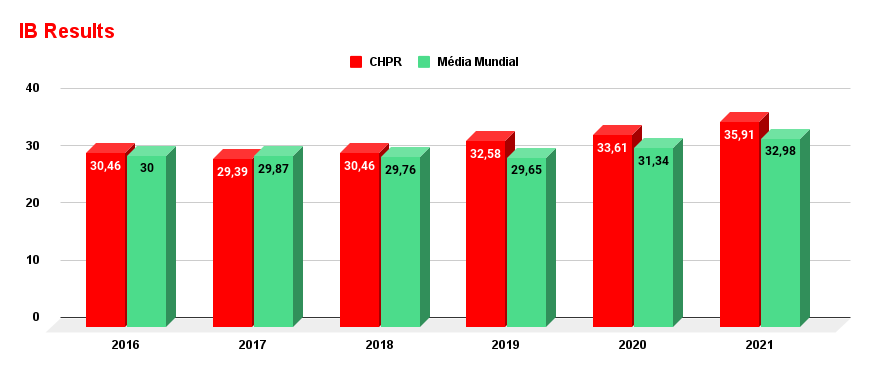IB Diploma
In our school, all students in Secondary Education complete the International Baccalaureate Program – IB, whose diploma is recognized in major Universities abroad, in addition to developing academic skills ready for working life. The National and Swiss Curricular parameters and the IB Program are worked in an integrated manner.

History
Thanks to the efforts of a group of international educators, the program of the IB Diploma – International Baccalaureate – was created in 1968in order to build a common curriculum and an international diploma which opens the doors to leading universities around the world.
These educators had an educational ideal: students trained by the program should share an academic experience with a particular emphasis on critical thinking, intercultural understanding and be in contact with a wide diversity of points of view.
Since 1996, the Swiss-Brazilian School of São Paulo has been part of the International Baccalaureate Organization – IB.
Learn more about International Education – https://ibo.org
THE PROGRAM

The IB Diploma Program is characterized globally as a demanding pre-university course for students aged between 16 and 19 years. It involves rigorous assessment, following well-defined criteria, and culminates with external exams, simultaneously administered across the Organization around the world.
At the center of the circle of the IB program are:
Theory of Knowledge:
Final Assignments on the Theory of Knowledge. It aims to address the nature of human knowledge, reflection of the processes of learning in all areas that make up the IB diploma and establish connections with the academic areas.
Extended Essay:
Elaboration of an autonomous scientific assignment. This is a dissertation of up to 4,000 words, with supervision of a tutor, which requires students to complete an assignment of scientific research on topics they have chosen.
CAS – Creativity, Activity, Service:
Requires the preparation of a Final Assignment, supervised by a tutor, focusing on all the areas approached:
- Creativity: Weekly classes of Arts, plus a Curricular Focus Week. Currently includes assignments of photography, painting and music with professionals in the field of art;
- Activity: Weekly classes of Physical Education, plus a Curricular Focus Week;
- Service: Social assignment in charitable institutions, such as day care centers, youth centers, nursing homes and hospitals.
SKILLS DEVELOPED

- Leitura e compreensão de textos com diferentes características, em vários níveis de aprendizagem e em várias línguas – Alemão, Português, Inglês e Francês;
- Apresentações orais, para a análise de desempenho linguístico, com provas orais gravadas e avaliadas no exterior;
- Elaboração de textos, por meio da produção de dossiês, baseados em temas livres;
- Elaboração de resenhas de livros sobre literatura e ciências humanas;
- Pesquisa interdisciplinar nas ciências naturais: Biologia, Química e Física;
- Trabalhos de campo, com saídas para pesquisa em Geografia e Biologia;
- Elaboração de portfólios nas ciências exatas: pesquisa pessoal com apresentação de conclusões; modelagem e análise matemática;
- Estudos de música, fotografia, cerâmica, pintura, com projetos integrados na Semana de Estudos;
- Saídas para locais onde se exigem habilidades específicas e superação de desafios: escalada, vela, caminhadas, canoagem e outros;
- Produção e apresentação oral de trabalhos acadêmicos, ”Extended Essay”, com o objetivo de desenvolver e aprimorar as habilidades para o campo profissional;
- Desenvolvimento de atividades sociais integradas ao Programa CAS, preparando os jovens para lidar com as diferenças;
- Desenvolvimento do senso crítico, a partir da compreensão, interpretação e reflexão de diferentes pontos de vista científicos, sociais, culturais, programa TOK e História;
Profile of the IB student

O objetivo de todos os programas IB é desenvolver pessoas internacionalmente conscientes que, reconhecendo sua humanidade comum e a compartilhada proteção do planeta, ajudem a criar um mundo melhor e mais pacífico.
Os alunos IB se esforçam para ser: Informados, Arrojados, generosos, reflexivos, íntegros, comunicadores inquiridores, equilibrados, mente aberta e pensados.
Frequently Asked Questions (F.A.Q.)
Very few universities accept only the IB Diploma. Most require the SAT. However, once accepted, the universities give credits to the subjects taken at Higher Level.
Yes. The faculty of Economics of FGV, FIA, ESPM and FAAP accept the IB Diploma.
No. Language examinations, such as TOEFL and IELTS, are valid for 2 years.
45 points. The maximum score in each of the six subjects is 7, which totals 42. In addition, there is a bonus of up to 3 points from the combination of the grades for Theory of knowledge (TOK) and Extended Essay (EE), grades from A (maximum) to E (minimum). There is no grade for CAS (Creativity, Action and Social Service) but, if the requirements are not met, the Diploma is not awarded, regardless of the points achieved.
The federal universities in Switzerland require 32 points (without the grade for TOK and EE). Additionally, the student must have studied Mathematics or a science in HL. The ETH University requires 38 points.
The student has 3 opportunities to obtain the IB Diploma or improve their score, which do not need to be consecutive. After the first session of exams, two more attempts can be made, in sessions called “retake”.
No. The highest grade will always prevail.
No. In our school, all Secondary Education students complete the International Baccalaureate Program – IB.